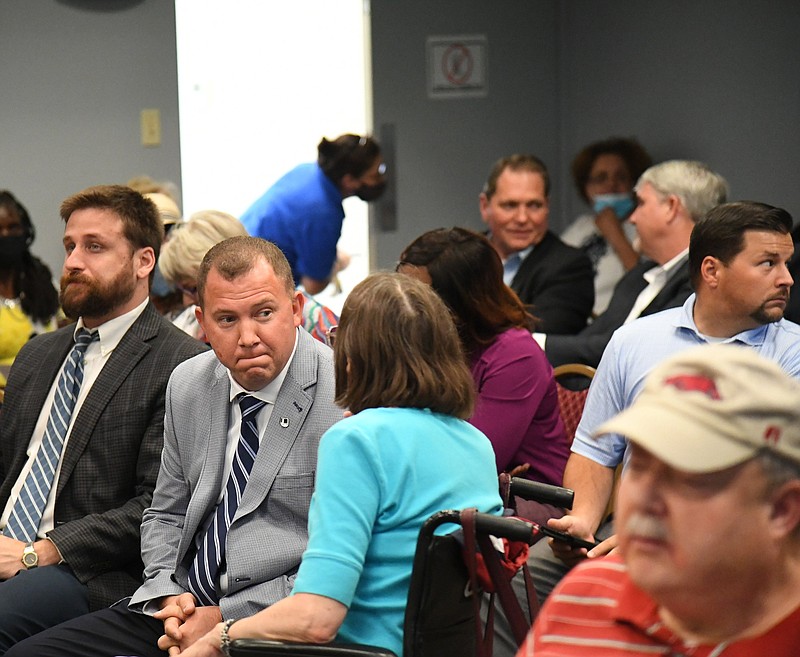The conditional-use application the Hot Springs Planning Commission unanimously approved for Covenant Recovery's residential drug and alcohol treatment facility on Linden Street may have included elements prohibited by the zoning code, city officials said Tuesday.
In March, the planning commission granted the Pine Bluff nonprofit a conditional use allowing the facility to house up to 48 residents, prompting an appeal from Whittington Valley Neighborhood Association President Mark A. Toth. The Hot Springs Board of Directors' 3-3 vote at its May 4 business meeting overturned the planning commission action.
Its 4-2 vote at its June 15 business meeting authorized Tuesday night's rehearing of the appeal. A 4-2 vote Tuesday night sent the application back to the planning commission for further review.
A letter Covenant Recovery Founder and Director Jeremy McKenzie included in support of the nonprofit's application said it intended to license the 10,000-square-foot building with the Arkansas Department of Correction's Division of Community Correction.
"Quapaw House operated this facility under the guidelines set forth by the Department of Human Services Division of Behavioral Health, as well as Arkansas Community Correction," the letter, dated Feb. 5, said. "Covenant Recovery is currently in the process of securing licenses from both of the above-named state agencies."
City Attorney Brian Albright told the board Tuesday that facilities licensed by the state agency that oversees probationers and parolees are not allowed as a permitted or conditional use in areas zoned for residential activity and in most areas zoned for commercial activity.
Covenant Recovery's 4-acre campus at 276 Linden St. is zoned Office/Neighborhood Commercial, or C-3. It's surrounded by Low-Density Residential, or R-3, zoned neighborhoods. Heavy Manufacturing, or M-2, zones are the only areas where correctional facilities are allowed, according to the zoning code's table of uses.
"If this is in any way a correctional facility that requires license pursuant to the state statute for transitional living, that is just simply not permitted under our table of uses," Albright said. "If it's correctional in any form or fashion, it's just not permitted."
Planning and Development Director Kathy Sellman told the board the nature of activity proposed for the site wasn't clear when the planning commission approved the application.
"In recent conversation with the city attorney it has come forward that some of the activities that were proposed are characteristic of something that would be a halfway house type of operation," she said. "That was not clear in the beginning."
McKenzie told the board Tuesday that his plan has changed since the planning commission endorsed the conditional use in March.
"We applied to run a facility that was going to be licensed by both DHS, which is what we've already applied for, as well as a transitional housing application," he said. "We talked about that right here in this room. It was approved unanimously by the planning commission.
"Let me be clear, since that time, and since we've received so much community feedback, we've been forced to change the level of service we have there. Since we've had so much pushback from the community about transitional housing and about court dates and inmates, we've transitioned solely to the Division of Behavioral Health. That would be the only license we have there. It's acceptable by me for you to put a stipulation on where we can never change that."
The board declined to impose the stipulation, deferring to the planning commission. Mayor Pat McCabe said activity proposed for the site needs to be distilled to a one-page document that explicitly states which agencies would license the facility.
"There must be assurance as to the scope of the program," he said. "(The application) has to go through a certain process, so when we approve or disapprove we actually know, very succinctly, what the action item is. I think the planning commission is the better choice to sort this out."
District 1 Director Erin Holliday told the board it could approve amendments to the application, including a stipulation prohibiting the facility from housing probationers and parolees. She and District 2 Director Elaine Jones voted against the motion to remand the application.
"I think it going to planning quite frankly just kicks the can down the road," Holliday, whose district includes the Linden Street property, said. "We'll be hearing this again in 60 days. If there is a solution that we can come to based on the testimony given this evening, I want to be solution-oriented and move forward on behalf of us, the neighborhood, the community and try to find the best solution for everyone.
"Planning is going to be hearing all the stuff we heard. It's just going to keep adding chapters to these documents, or we can put in writing whatever conditions we can legally put in place based on the code."
About a dozen people addressed the board during Tuesday's hearing, but many more were waiting their turn in the lobby of City Hall when District 4 Director Carroll Weatherford made the motion to send the application back to the planning commission. Most of those who spoke opposed the expanded occupancy requested for the property.
"I do want to apologize to all those who had signed up both for and against who were unable to address the board this evening," McCabe said. "Thank you for your attendance."

